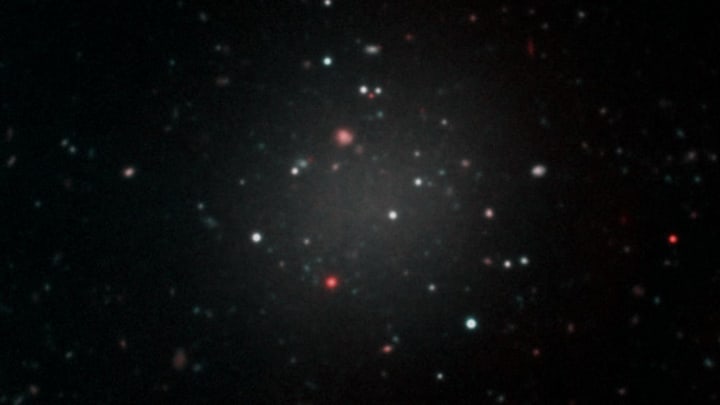A Newly Discovered Galaxy Has a Shocking Feature—No Dark Matter

Astronomers have discovered a galaxy that upends what we thought about galaxies. A new study in Nature reports that this one has almost no dark matter—unlike just about every other galaxy ever observed.
Called NGC1052-DF2, the new galaxy is an ultra-diffuse galaxy, a type that is large but still appears faint and contains few stars. Ultra-diffuse galaxies in themselves aren't very rare, but scientists have never observed one without a significant amount of dark matter, a component thought to be a vital part of the galaxy-formation process.
"For decades, we thought that galaxies start their lives as blobs of dark matter," said Yale University astronomer Pieter van Dokkum, lead author of the study, in a press release. "NGC1052-DF2 challenges the standard ideas of how we think galaxies form."
The research team first observed the galaxy, located 6.5 billion light-years from the Milky Way, using the Dragonfly Telephoto Array in New Mexico, a telescope designed specifically for finding ultra-diffuse galaxies. They also gathered data from the Gemini North Observatory and W.M. Keck Observatory in Hawaii and several other telescopes around the world.
They discovered the lack of dark matter in the galaxy from spectral data that showed that objects in the system were moving slower than expected, meaning the system didn't have a lot of mass. By their calculations, the mass of the galaxy can be almost entirely attributed to the stars, meaning there is little dark matter there—a contrast to just about any other galaxy observed. (Meanwhile, in 2016, van Dokkum and his team found an ultra-diffuse galaxy that is made up of 99.9 percent dark matter.)
"There is no theory that predicted these types of galaxies," van Dokkum said. “The galaxy is a complete mystery, as everything about it is strange. How you actually go about forming one of these things is completely unknown."
The discovery provides more evidence for the dark matter hypothesis, and means that it isn't just a part of galaxy formation. It exists on its own, separate from its role as a galaxy component. The research team has already found a few other diffuse galaxies that appear to resemble this new galaxy, and plans to continue searching for and analyzing these dark-matter-free systems.